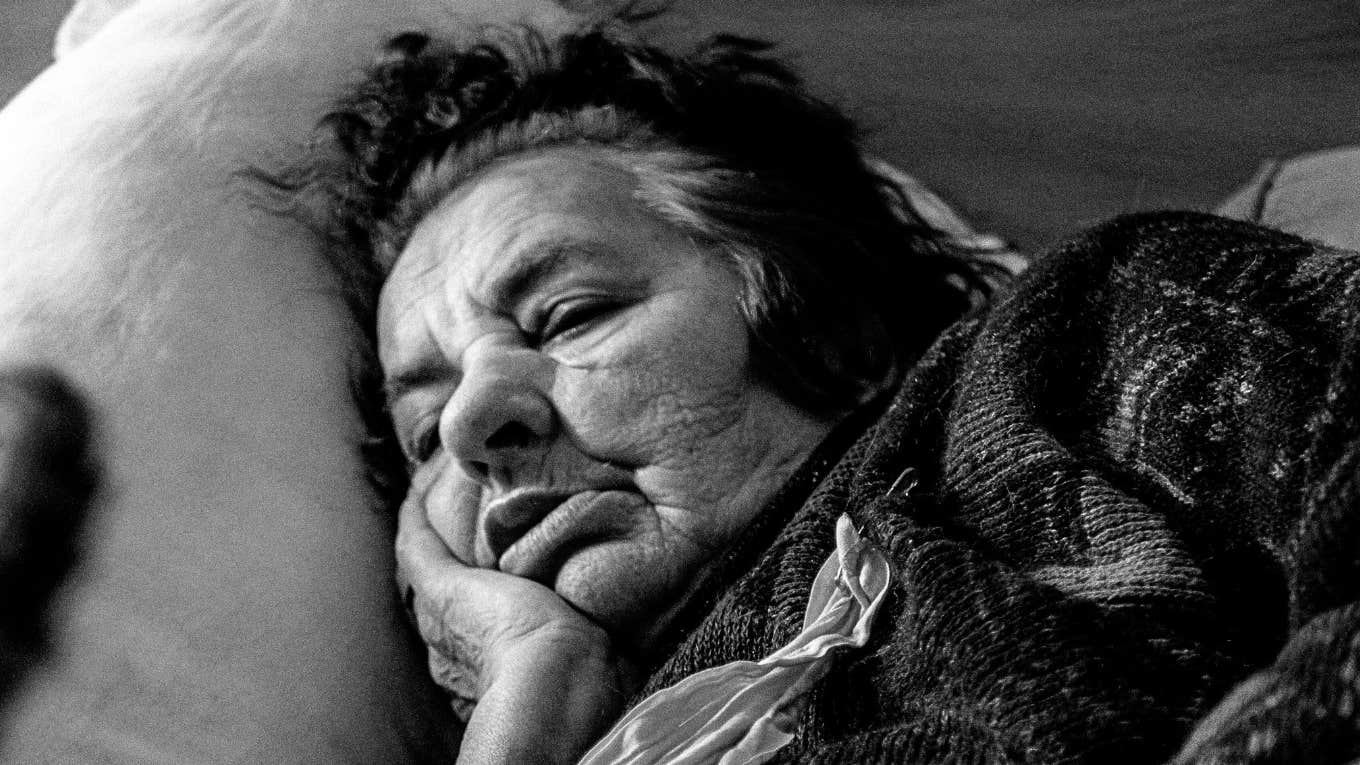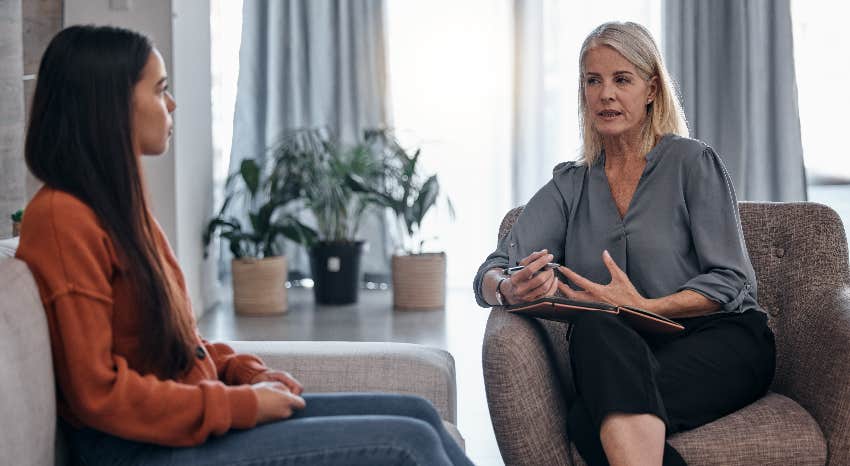My Mother Was Dying — So I Called A Psychic
Ambiguous loss and my intense desire for control.
 Yan Berthemy | Unsplash
Yan Berthemy | Unsplash I called a psychic. It was in the days before my mom died. April 2022.
She always seemed to be dying back then. She went in and out of emergency procedures and life-threatening diagnoses; we said goodbye so many times that I lost count.
Her mind had already gone. Her body had betrayed her. But her soul refused to leave.
For years, we stayed in this state. Mom kept rebounding, and I felt stuck in an endless cycle. It was killing me — faster than it was her, apparently.
This time seemed like it really might be the end. I dropped everything to fly across the country and spent a week by her hospice bed. I held her hand, told her stories, and smelled the stale scent of her life expiring. I willed myself to say goodbye.
My mother was dying — so I called a psychic
 PrasongTakham / Shutterstock
PrasongTakham / Shutterstock
These were all things I had done before. I was numb to the motions, even as I went through them. They had lost their electricity from too many dress rehearsals, but I couldn’t not be there. Of course, I had to go.
My sister took me out to lunch. Over salads and martinis, we read The Dying Experience pamphlet that hospice had provided to us. We laughed when we weren’t crying. We told mom it was okay to let go, just like the booklet said we should do.
But despite having no food or fluids in weeks, despite not even being conscious at all, Mom still held on.
Why? I could not logic my head into understanding.
Eventually, the nurses encouraged me to leave. Nothing could be gained by staying when the timeline was uncertain. I packed up, and I flew back home. For more than a week after, this continued. At times, they even called to say she seemed to be improving. I wanted to scream.
I have never felt such blind rage at the universe as I did then. I hated myself for wanting her to die, and I felt cheated out of the poignant sadness that I thought should accompany losing my last parent. I swirled in a dual cyclone of self-loathing and self-pity.
I relayed all of this to a friend one morning on a long walk, and she sent me the number for a psychic in California. After thoroughly judging her — for both the suggesting and the having of an actual psychic to refer — I got over myself and decided to give it a try.
So, I called the psychic the next day.
 Yuri A / Shutterstock
Yuri A / Shutterstock
In between Zoom meetings in my little attic office, I reached her answering machine. I said something like this:
“Hi, I’m not sure what I’m doing here, but my mother is dying for what feels like the eighth time, and I don’t understand what is taking her so long, but I can’t handle this wait, and I’m not sure I believe in God, but why do I have to endure this? And also, how can I stop making this all about me?”
Sometimes, when I am in grief, I feel my most selfish. I’ve spent a lot of my life in grief. The psychic called me back an hour later, and we spoke for a total of five minutes.
She said she could see my mom.
She described the room she was in, accurately recalling the place where I’d just said goodbye the week before.
She described the people that my mom was with, chillingly accurate descriptions that matched Mom’s siblings. It sounded like her sister and brother, both of whom had just passed away in the months before. Both of whom had broken Mom’s heart earlier in life, and neither of whom she had ever reconciled with.
Then, the psychic said this:
“Listen. You and her, you’re just fine. Your mom doesn’t need you to be with her anymore. She wants you to focus on your living family, on yourself, on your life. This isn’t about you now. This will happen on her own time frame, and she isn’t quite ready to go yet.”
She explained that Mom had unfinished business with her siblings, and when they had addressed it, she would finally let go.
I asked, Why did this have to happen before she died? Couldn’t they all meet up in the afterlife?
The psychic said, “That’s not how it works.”
She predicted that Mom might die the very next day. And she did.
I think about this all the time. My pain felt so complex and so unique; an experience I had never heard of or seen reflected in any other situation.
And yet, the answer I so desperately sought was actually painfully simple: I had to let go.
Stop seeking relief in control. Focus on my living family. Focus on my living. Live.
My favorite book as a child was called “All Around the Neighborhood.”
A child and her mother conduct a series of errands together. That’s the entire plot. They visit the post office, the library, the grocery store. My mom and I used to snuggle up and read it together.
My childhood was filled with undercurrents of sadness, and Mom’s was too. It’s something we both inherited. I think we also got the same thing from that book: comfort in routine, familiarity in community, the belonging that comes with riding along together, going about our mundane to-dos.
For years, whenever we ran errands, we would remember this book. “All around the neighborhood!” we’d say, as we went off to complete our chores.
When I get homesick, this is what I think of. When I miss my mom, this is what I grieve.
It’s not a place I can ever go back to. It’s just a feeling. It’s a shared longing that was at the core of our love, something that only my mom would understand. And she’s gone now.
These are the rhythmic behaviors that make up the patterns of our lives. The knowing of a place, the participation in a community, the well-worn vernacular we share only with our families.
When we experience loss, it is a sort of homesickness unfolding.
We lose people, and we also lose sensations and experiences we can never have again.
Moments and rituals are lost to time forever. Ambiguous loss is what occurs when someone’s fate is unclear or uncertain.
Mayo Clinic defines it as the juxtaposition of losing either a physical or emotional connection while the other kind remains. We talk about it in relation to experiences like Dementia, Alzheimer’s, divorce, abduction, or war. But I’ve never seen anyone truly give voice to what this suffering actually feels like.
There is a pain in the continuous unknown that is deeply excruciating. I spent more than a decade in this non-space with both of my parents, as they each withered away in their ambiguous, continuous declines.
My only choice was to accept it. There was no other option.
I saw therapists, explored boundaries, and adopted a lens of “What will I regret the least down the road?” and “What would the last, most present version of her would have wanted?” to try to access the voices they no longer had.
I’ve spent more time imagining conversations with my parents than I can ever recall actually talking with them. Ambiguous loss is a complete lack of control that subsumes your entire existence.
I hate lacking control. In response, I avoided ongoing entanglements and sought out closure wherever I could. I gravitated toward validation, payoffs, and endings, and any semblance of closure I could find.
When I launched my own business, five years ago this month, this tendency became manifest in almost comical ways. I would sell short, fixed-fee projects with a clear beginning, middle, and end. I avoided ongoing, recurring clients like the plague.
Life phases unfold and overlap in unruly, disorganized ways.
For me, it felt like everything collided at once: I nursed new lives into existence while trying to let my parents go; I internalized the sharp pain of their disappearance, even while I built the foundation of my life.
Over the course of eight years, I had two children and I lost two parents, all while growing my power in the pinnacle of my career. All along, I suffered alone. I felt silenced, stuck in a grief that was not understood. Alienated in my rage.
Until suddenly, one day, it was over. And I was left to pick up the pieces.
After I spoke to the psychic, things did start to shift.
My mom died the very next day, as predicted. “Well, she’s dead,” my stepfather called to say, in the afternoon on April 7. “I walked out into the living room, and she just slipped right away.”
After all that agony, all the false starts, that’s how she went. She slipped, ever so lightly, out of this world. I think many of us want to believe that long, drawn-out experiences with anticipatory grief will give us a leg up on the pain once the death actually happens. That’s not how it works.
For me, at least, all I felt for a while was numb. I had thought I’d feel immediate relief from the endless roller coaster of almost-deaths and miraculous recoveries. But instead, I felt nothing.
“I feel like my grief is locked up in a box,” I said to my new therapist, the following week. “It’s hidden somewhere deep inside, and I can’t figure out how to access it.”
She asked me how I thought my nervous system was doing. I had no idea how to answer that question. We worked for weeks, then, to help me move into a place of quiet and peace, so I could finally reach that lockbox.
It required a level of patience I had never even tried to access before. Patience is not a virtue for those of us who run for our whole lives, surviving what we cannot control through constant forward motion.
I went for long walks in the woods. I’d set foot on a path and be wracked with sobs.
The grief would consume me completely, loud and ugly and demanding my full surrender.
And then, it would move along. Leaving me breathless, very sad, and a tiny bit lighter.
For months, I did this. I worked, still, but between calls and writing time, I’d sit completely still on my deck, staring into space.
“Never in my life have I worked so little,” I said to a friend that Fall. “Maybe you’ve never worked this hard,” was her astute reply.
Over time, my whole constitution changed. I settled into a new, calmer, more accepting state of existing. My parents could no longer inflict new pain, and I felt safer, like a new chapter in my relationship with them could begin.
I started working to tell their story, and in doing so, started to find mine. I’ve shared this process with my family, especially my little girls, trying as I go to model and demonstrate the power of sitting with sadness and talking about those we’ve lost, so that we may live even while we hurt.
And that is how I have heeded the psychic’s advice. I learned to let go of what I cannot control.
To release the dying. Embrace the living. And live.
Just like on those days with my mom, all those years ago, when we went All Around the Neighborhood. Embracing the mundane, doing the things that the living do.
Homesick, but also, completely at home.
Cat O’Shaughnessy Coffrin is a writer, speaker, consultant, and coach, whose work focuses on helping women reclaim their voices. She has been featured in Fast Company, Medium, Forbes, Bizwomen and Business Insider among others.

